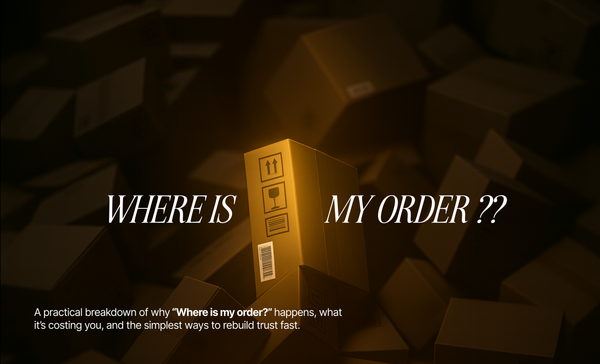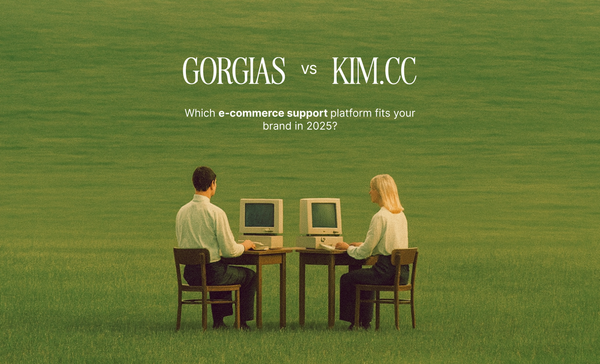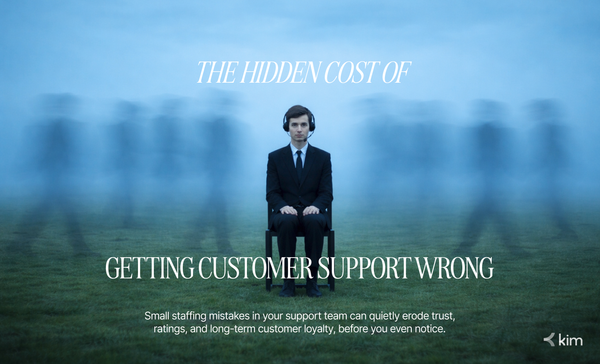Testing Domain Knowledge of Virtual Assistants
Hire exceptional virtual assistants (VAs) for your DTC brand with Kim.cc's proven testing process to ensure domain knowledge & customer service excellence

Think of it this way: Imagine a customer inquiring about a complex product feature. A representative with a deep understanding can explain nuances, troubleshoot issues, and recommend solutions confidently. This builds trust, fosters satisfaction, and sets your brand apart.
Key Takeaways
- Why do you need to test domain knowledge, supported by statistics
- Understanding the Multifaceted Nature of Domain Knowledge
- Kim.cc's Multi-Step Approach to Testing Domain Knowledge for DTC Brands
- Benefits for DTC Brands
Why do you need to test domain knowledge, supported by statistics
Your brand's success hinges on building strong relationships with your audience, and the frontline of this connection is your customer support team. But with a plethora of potential virtual assistants (VAs) vying for your attention, how do you ensure you're selecting the best fit for your unique brand and offerings?
The answer lies in domain knowledge, an often overlooked yet critical factor in crafting exceptional customer experiences. Research by Forrester reveals that customers are 57% more likely to repurchase from a brand if their inquiries are resolved by knowledgeable agents. This translates directly to higher customer satisfaction, brand loyalty, and ultimately, revenue growth for your DTC brand.
Here's why it matters:
Statistics speak volumes:
- 73% of customers say friendly and knowledgeable customer service is key to building brand loyalty (Zendesk).
- Studies show a 5% increase in customer retention can boost profits by 25-95% (Bain & Company).
Simply put, domain knowledge translates to better problem-solving, faster resolution times, and ultimately, happier customers. But what exactly is domain knowledge, and how do you ensure your virtual assistants (VAs) possess it?
Understanding the Multifaceted Nature of Domain Knowledge
Domain knowledge isn't a one-size-fits-all concept. It's a multifaceted blend of industry-specific expertise, product understanding, and brand familiarity. In the context of DTC brands, this translates to:
- Product & Industry Expertise: Your VA should understand the nuances of your niche, and the the regulatory landscape. They should possess a deep understanding of your product category, its technical specifications, and its competitive landscape. They should be able to answer intricate product questions, troubleshoot issues, and suggest relevant solutions.
- Platform Proficiency: Familiarity with your chosen eCommerce platform (e.g., Shopify, Bigcommerce) is crucial for navigating backend tasks, managing orders, and utilizing platform-specific features efficiently.
- Customer Service Software Savvy: Proficiency in tools like Gorgias, Zendesk, or Freshdesk ensures your VA can handle inquiries effectively, manage tickets efficiently, and leverage automation to streamline processes.
- Brand Nuances: A true understanding of your brand's values, voice, and target audience allows your VA to deliver personalized and consistent interactions that resonate with your customers.
Tailoring Knowledge to Fit Your DTC Brand
While the core components of domain knowledge remain consistent across industries, DTC brands have unique requirements. Your VA should understand:
- Subscription models, recurring payments, and cancellation processes.
- Direct-to-consumer marketing strategies and their impact on customer queries.
- The nuances of building community and fostering brand loyalty online.
- Shopify platform specifics and troubleshooting common technical issues.
Testing Technique
Identifying the right VA doesn't happen by chance. A structured approach to testing domain knowledge is essential. Here are some effective techniques:
- Targeted Screening: Filter resumes based on specific skills relevant to your DTC brand, including experience with customer support software like Gorgias, Zendesk, or Freshdesk, and familiarity with Shopify or Bigcommerce.
- Domain-Specific Tests: Design or utilize existing tests that evaluate the candidate's knowledge of your specific industry, product line, and brand. This could involve product quizzes, case studies, or simulations of real-life customer scenarios.
- Ticketing Tool Certification: For VAs handling customer interactions on your Shopify store, consider requiring them to obtain a certification from Gorgias/ Zendesk to ensure proficiency in the platform.
- Practical Assessments: Invite shortlisted candidates to complete practical tasks that mirror actual customer support situations. Evaluate their ability to research, problem-solve, and communicate effectively.
Kim.cc's Multi-Step Approach to Testing Domain Knowledge for DTC Brands
Kim.cc testing process goes beyond basic skills checks, offering a multi-step approach tailored specifically for DTC brands and customer support roles. Here's how it works:
Step 1: Pre-Screening for Relevant Skills
- Kim.cc starts by filtering candidates based on your specific requirements. They scan resumes for keywords and experience indicative of relevant skills, including:
- Experience with customer support software like Gorgias, Zendesk, or Freshdesk.
- Previous experience with Shopify or Bigcommerce (highly preferred but not mandatory).
Step 2: Cognitive Assessment
- Candidates who pass the initial screening are invited to take a cognitive ability test. This helps assess their problem-solving skills, critical thinking, and ability to learn new information – crucial qualities for navigating complex customer situations.
Step 3: Tool Certification (Optional)
- If your specific needs require in-depth knowledge of the tool/ platforms, candidates who perform well in the cognitive test may be invited to take the official tool certification offered by these platforms. This demonstrates their proficiency and understanding of the platform's functionalities.
Step 4: Practical Skills Test
- The final step involves a 50-minute test specifically designed for using Gorgias/ Zendesk in a DTC customer support context. This hands-on assessment evaluates the candidate's ability to:
- Navigate the platform efficiently and confidently.
- Apply their knowledge to real-world customer scenarios.
- Troubleshoot common technical issues related to Shopify or Bigcommerce.
- Communicate effectively within the platform and demonstrate customer service best practices.
Beyond the Test
Kim.cc's testing goes beyond just scoring. They also analyze the candidate's thought process and approach throughout the assessments, providing valuable insights into their problem-solving skills, adaptability, and potential fit for your specific brand culture.

Benefits for DTC Brands
By partnering with Kim.cc, you gain access to a pool of pre-vetted candidates with the essential skills and domain knowledge required for success in DTC customer support. This saves you valuable time and resources while ensuring you hire VAs who can:
- Hit the ground running with minimal training.
- Provide exceptional customer service that fosters brand loyalty.
Remember: While Kim.cc's testing process is robust, it's important to tailor it to your specific needs. Consider incorporating additional assessments or interview questions to evaluate factors like soft skills, cultural fit, and brand alignment.
Want to learn more about how kim.cc can find the perfect VA match for your brand? Contact us today for a 14-day free trial and unlock the power of exceptional customer support!



